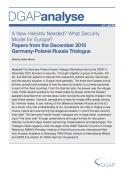-
Foreword
Russia’s annexation of Crimea and the war in eastern Ukraine have undermined the post-Cold-War security order in Europe. Its recent actions have called into question not only the sovereignty and borders of the Ukrainian state but also the very foundations of contemporary European security: the Paris Charter and the Budapest Memorandum. The main goal of this destabilizing policy is to renegotiate the principles of European security and to obtain guarantees from the West for Russian influence in the former Soviet states. Rather than strengthen the OSCE and its approach of collective security with equal rights and equal security for all participating states, Russian leaders are promoting a new style of bargaining between Great Powers. This harks back to Yalta, or even to the Vienna Congress of Metternich’s day. Moscow has its sights set on a deal with Washington involving nothing less than security guarantees for Russia and the recognition of its exclusive sphere of influence.
With the Western sanctions, the economic, social, and political interdependence between Russia and the EU has become a threat to Russia’s own security. The EU is using economic ties to put Russia under pressure to stop its action in Ukraine. Current Russian policy aims to cut off these links.
The escalation in tensions between Russia and the EU is first and foremost the result of completely different threat perceptions. Brussels perceives its neighborhood policy as a guarantor of economic and political reforms, stabilization, and growing social welfare in the countries on its eastern borders. The Russian elite, on the other hand, perceives that policy as a serious infringement into its traditional sphere of influence. From Moscow’s perspective, this undermines Russia’s birthright in its immediate neighborhood, paving the way for “color revolutions” and regime change. Indeed, as the Kremlin sees it, the main aim of Western policy in post-Soviet countries is not so much regime change in, say, Kiev but in Moscow itself. By this logic, the mass demonstrations that took place in Moscow and Saint Petersburg in 2011–12, during which thousands of Russians protested the outcome of parliamentary and questioned the presidential elections, are seen as proof of the pernicious influence of Western policy.
The main problem with this way of looking at the world is that it sees society as something to be manipulated rather than a relevant political actor in its own right. It underestimates social change and the power of social movements to influence national and international politics. For this reason, Russian leaders have underestimated domestic political dynamics on several occasions – not only in Russia 2011–12 but also particularly in Ukraine in 2004 and again in 2013–14. High-ranking Russian officials argue that the currents that brought about Ukraine’s 2004 Orange Revolution and the subsequent Euromaidan movement were the result of outside meddling – chiefly by the US, which they see as wanting to weaken Russia just as it did in Cold-War times. It is extremely difficult to break free of this paradigm because it is so deeply grounded in the Russian ruling elite’s historical stereotypes and paranoia.
Russia’s leaders have the impression that their country is at war with the West. This February, Russian Prime Minister Dmitri Medvedev spoke at the Munich Security Conference not about an upcoming Cold War but rather confirmed that we are already in a new Cold War. Seen from Russia, this hardly seemed spectacular; for the Kremlin considers it a fact. Indeed, Russian media and decision makers were more surprised by the Western “overreaction” to Medvedev’s speech than to its actual content, which to them seemed simply to offer a sober analysis of reality. This again confirms the degree to which so many European politicians fail to understand the mindset and logic of Russian politics. Only gradually are they realizing that a fundamental conflict with Russia is underway – not only over Ukraine but also about norms, principles, and the security order in Europe.
One example of this is the Russian propaganda currently being rolled out via various media platforms. From a Russian point of view, Moscow’s robust “information war” is simply a reaction to similar media tactics being conducted by the West. By this logic, the activities of RT and Sputnik – to say nothing of the legions of “trolls” posting negative comments on the Internet portals of Western media and NGOs – question the existing media discourse in Europe and aim to tell “the story behind the story.” This undermines the credibility of Western media and aims to confuse the public on what are facts and what is fiction. The basic instruments of this “war” are nothing new, even if they have taken on cutting-edge, digital dimensions. What is surprising is how little the EU is prepared to engage in this kind of conflict, for it hardly arrived from out of the blue.
Russian decision makers have studied for years how the West, and particularly the US, makes use of media and non-governmental organizations to “manipulate” decision making and promote their preferred policies. The discussion in US media that took place in the lead-up to the 2002 invasion of Iraq continues to furnish an object lesson. In their minds, they are simply responding in kind: undermining the credibility of Western democracies, its media and institutions. It is worth noting, however, that Russian action with regard to media, supporting groups and using fake institutions is much more about understanding and using the weaknesses of the West than pursuing a long-term strategy or offering an alternative concept to Western media.
Media war aside, European politicians tend to overestimate the strategic depth of Russian policy on a variety of fronts. In fact, it is much more reactive and tactical than it is strategic. Moscow’s main advantage is that it is capable of rapid, non-democratic decision making and, as such, can be extraordinarily bold. It is accountable to no one, and this of course is also its weakness. Today’s Russia lacks a system of checks and balances and has no functioning correctives. Its current leadership is driving Russia toward deep political and economic crisis as well as international isolation. This makes the country even more vulnerable and will, in turn, increase the reactiveness of Russian policy. The weaker Russia becomes, the more aggressively its leadership will react. The fundamental loss of trust between Russia and the EU has created a stalemate situation from which neither side knows how to emerge. Even if Russian leaders try to improve the relationship at least rhetorically, as Medvedev did in Munich, European politicians no longer believe the words of Russian officials.
This is a very dangerous situation, for the clear rules and red lines of the Cold War are absent from today’s global context. Our December 2015 Trialogue Workshop – the fourth in four years – focused on security. It brought together a group of Russian, Polish, and German experts to discuss their respective national security discourses and the security situation in Europe more generally. As a series, the Trialogues aim to forge better understanding of “the other side” through presentations and opportunities for discussion. We believe these are crucial first steps in trying to overcome misperceptions and stereotypes. Under the current circumstances, frank dialogue of this sort is more important than ever.
We asked the participants to describe their country’s “main security threat.” From the German side, the answer was the refugee crisis. Polish experts pointed to the threat posed by Russia, while the Russian speakers described their worries about color revolutions and regime change in the post-Soviet sphere.
Certainly, it is necessary to acknowledge how very different the perceptions among EU member states can be, to say nothing of the difference between Russia and the EU as a whole. Only with a real rather than a wishful understanding of our counterparts can we work on a new modus vivendi and overcome the dangerous situation in which Europe currently finds itself.
The Germany-Poland-Russia Trialogue is conducted by the DGAP, IMEMO, PISM, SDPZ, and the Warsaw office of the Heinrich Böll Foundation. It will continue to pursue this topic in further workshops and will regularly present publications derived from those events. The three short papers included here provide short analyses of how the security situation is currently perceived in each of the three countries.
Stefan Meister, DGAP
Read all three papers by clicking on the pdf in the box to the right.



